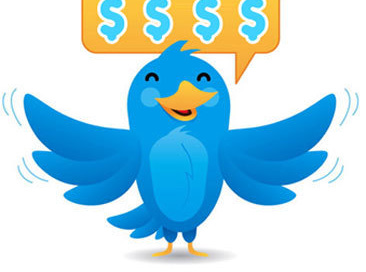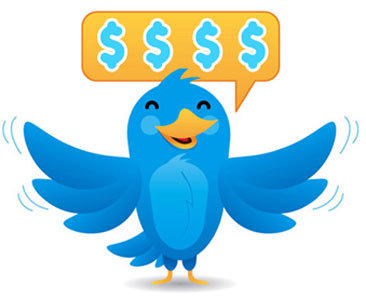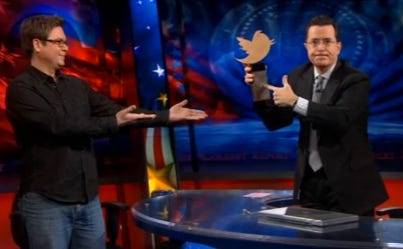Twitter : StumbleUpon :: Google : Goto.com/Overture
Twitter’s gigantic freakin’ revenue opportunity is promoted tweets. And similar to how Google found its business model at Goto.com/Overture, Twitter is taking its cue from StumbleUpon. But first….
Remember when Google didn’t have a business model? Yeah, the Internet and media giant with a valuation of $150-200 billion, $35+ billion in annual revenue, and ~$15 billion in annual cash flow couldn’t figure how to generate revenue while it was growing like a weed before 2000. Then they ‘adopted’ the paid search model; i.e., took it from Goto.com (which became Overture, which was acquired by Yahoo), got sued by idealab (Goto.com’s parent), settled for 2.7 million Google shares (which would be worth over $1.5 billion today if they never sold it - but they did), and yada yada yada for more information, well, Google it.
[[MORE]]Banners -> Paid Search -> ? (Hint: Promoted Tweets)
I’ve said before that Twitter 'feels’ like Google 'felt’ a decade+ ago, but now that its revenue model is becoming a little more clear that feeling is becoming more tangible. So let’s look at the evolution of that model. First, Twitter didn’t (really) do banner ads (save the sponsored 'definitions’ Twitter used to throw on the top right hand corner of the page). No surprise there. Neither did Google. But remember, Google (originally) got beat up for not using banners/etc. Next, Twitter didn’t do much to make money off search and got beat up for that much like how Google got beat up for not doing banner ads. My conclusion then was either:
they’re stupid (they’re not),
they haven’t gotten to it yet (perhaps), or
they have something more lucrative up their sleeves….
I think we have a winner: number three, in the form of promoted tweets. The Google parallel: paid search. Paid search had already had its credibility questioned because of its apparent distance from search 'purity,’ but as one of my clients from back in my banking days in the 90s pointed out, “Don’t you think companies that pay to have their results at the top will pay the most to get in front of users that want to see their content?” Good point. Turned out to work pretty well (though to be fair Google adopted a hybrid mode of paid and PageRank-based search results and remained true to its clean and clear user experience).
Promoted Tweets Aren’t What You Think
So the complaints re sponsored tweets cluttering users’ feeds and ruining the pure social experience start to roll in. Sound familiar? But as Business Insider pointed out last month, promoted tweets aren’t so bad. The BI writer pointed out that promoted tweets are brief, timely, credible, and (often) from celebs with personality so they’re fun. But there is and will be more….
If Twitter is able to deliver promoted tweets to users based on who they are, who they follow, what they post, what they click on, where they are, etc. and do so at the 'right time’ (i.e., when the user is 'looking’ rather than just delivering tweets chronologically), then those promoted tweets would not only be welcomed and enjoyed by users, but awfully lucrative.
For example, I follow Comedy Central on Twitter (huge fan of The Daily Show, Colbert, Tosh.0, etc.). The account shares jokes, clips, upcoming show alerts, ticket offers, merchandise promotions, etc. But if I don’t happen to be watching my Twitter stream when they post things I’m interested in (e.g., Colbert tix please) they missed me and I missed them. What if, however, Comedy Central is able to promote a tweet that shows up for me when I am viewing Twitter content and I am watching The Colbert Report (e.g., because it is between 11:30PM and 12:00AM Monday through Thursday and/or I am using the #colbert hashtag)? Much higher probability that I interact with that tweet. And if that tweet is trying to sell something, generate traffic, promote viewership, etc., well then we’ve got ourselves one very powerful business model.
Show Me the Numbers
It’s pretty intuitive and there are a bunch of statistics to support this. For example, Visibli put out a report in April of this year showing that Facebook posts receive 50% of their Likes within the first 1 hour 20 minutes of being published, 80% within the first 7 hours, and 95% within the first 22 hours. A year before that, Betaworks’s John Borthwick noted the half life of a tweet is, on average, approximately 4 minutes. In other words, social media updates get most of their 'action’ soon after they’re posted so their 'value’ is critically dependent upon factors like getting to people at the right time, place, etc.
A few companies have recognized this already and have begun to capitalize on it. If you haven’t had a look at Know About It, do. Know About It has you connect your social media accounts (Twitter, Facebook, etc.) and then sends you a daily email ('Links you should know about…’) with relevant content (links) that its algorithm selects based upon who you are and how you’re connected to social media (not just what’s trending/popular). There are a handful of companies in this space more broadly speaking (e.g., Summify, etc.), but what I found particularly interesting about Know About It is that the percentage of users that click on at least one link after opening the daily email is between 40-50%. (Note: this excludes users that do not open the email.) That is an absolutely ginormous click through rate. Why so high? Well, Know About It uses your social data to provide you with things you likely will find interesting so users tend to interact more. If the company is able to deliver promoted content that is relevant to users then it should find a nice revenue model. (Disclosure: I am an advisor to Know About It.)
This is sponsored content discovery and this is big.
Anybody making big money from sponsored content discovery already? Yup. StumbleUpon. StumbleUpon’s 20 million members discover web comment by 'stumbling’ around the web via the company’s apps, plug-ins, etc., which navigate users to random content relevant to them based on their StumbleUpon profile of interests and other data. The content displayed to users is relevant because the user told StumbleUpon what it wants to see. But every few 'stumbles’ is promoted, meaning that the content provider paid to have that site displayed to StumbleUpon users. Do users care? No. Of course not. The promoted content is still relevant to the users based on their profiles. Sound familiar? Yes. Of course it does. Paying to promote content is: (1) not new, (2) very lucrative, and (3) getting more effective because each paradigm shift (web to social, tethered to mobile, etc.) provides the opportunity for companies to more effectively know and reach their target consumers. (Note: eBay did recognize StumbleUpon’s value in 2007 when it bought it for $75 million. Then eBay dumped it to some smart investors and its smart founder, who bought it back for a song - a move now known in eBay vernacular as “pulling a Skype.”)
This trend is unlikely to stop with promoted stumbles and tweets. It’s only a matter of time before companies like Groupon and LivingSocial start sending you more relevant deals. Yipit already has users create a profile of interests so that the service can send users relevant deals based on their interests and location. It’s only a matter of time before companies like these also base what they deliver to individual users on what they and their friends have purchased before as well as on how they interact and are connected to social media. I’d argue foursquare is on its way already by combining location data and social connections to deliver relevant deals (for which it gets paid - sometimes) to users. On the B2B side, LocalResponse, which allows brands and merchants to tweet offers to people based on where they’re checking-in, has experienced 40% CTR on its ads (>100x the CTR of current online and mobile ads) - why so high? Again, relevance. (Disclosure: I am an advisor to LocalResponse and have an equity interest.)
Oh and Facebook is doing all of this stuff too. So yeah, social changes everything. And if paid search was the new banner ad then promoted content discovery is the new paid search.
(Last disclosure: I own a shtickle of Twitter through a private secondary market transaction.)





